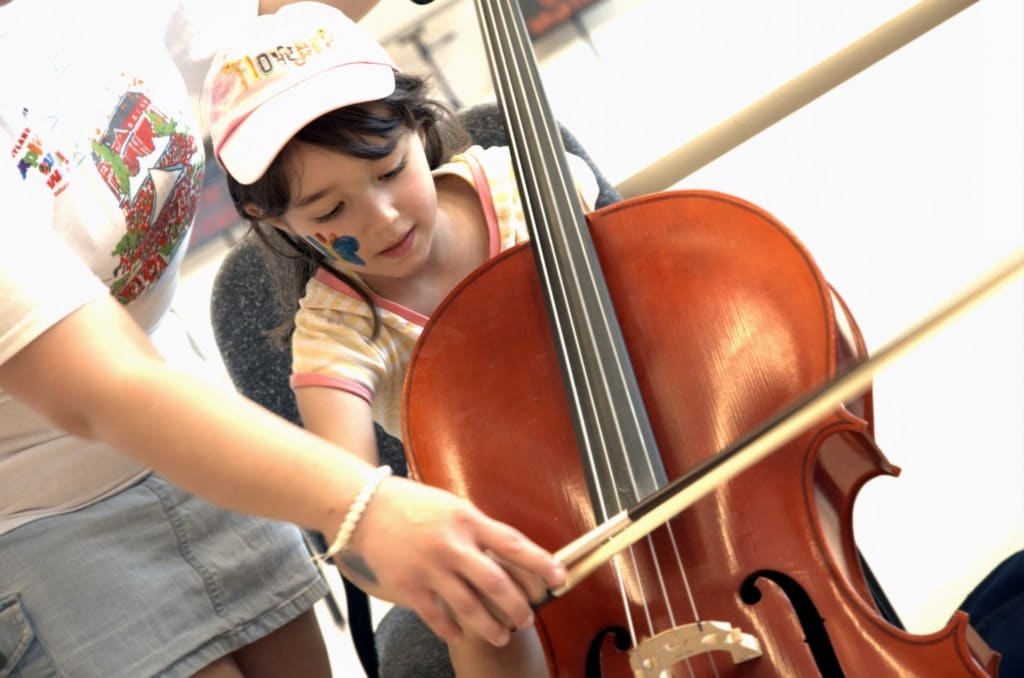Does your kid kick up a fuss when you take him/her for the weekly piano class? Are you ready to give up in despair? Don’t! Several studies have shown that learning music empowers your child’s cognitive and psychical abilities and also helps with overall psychological development.
Musical training accentuates perception, memory, analytic and reasoning skills, addresses attention deficit, and facilitates comprehension ability. Here’s an exhaustive list of all those areas of learning which are stimulated by early exposure to music learning.

1. Verbal and Mathematical Ability
According to a study by researchers at Boston College, children between five to seven years of age undergoing musical education show greater development in cranial areas related to manual dexterity and verbal and mathematical skills.
Another study, done by E. Miendlarzewska, says that “children who undergo musical training have better verbal memory, second language pronunciation accuracy, reading ability and executive functions.”
These studies merely confirm what several other studies have already noted, that music enhances the spatial-temporal locations of our brains. Spatial-temporal logic is the ability to piece together things (from simple puzzle-pieces to complex concepts) into a comprehensive whole.
Music helps us gain this step-by-step approach to a verbal or mathematical problem, thus guiding both intuitive reasoning and analytical ability skills. The logic of musical theory and notation is very similar to the heuristic methods we apply in the comprehension of languages and mathematical functions. It also enhances phonetic capabilities, that is, the relation of signs (written words) to spoken sound.
2. Memory
Those studying music theory often have to remember sheet after sheet of notes, as well as coordinate the musical notation with the actual playing. This visual and auditory co-relation helps strengthen mnemonic areas of the brain, enhancing short-term, long-term, visual, and verbal memory.
This means people with musical training from a young age can remember both visual details, sentences, and spoken words better than their musically naïve counterparts. They can also retain the small quantity of information which needs to be immediately available, as well as things which need long-term retention capacity.

3. Streamlining Sensory-Motor Reactions
Musical training evolves the motor cortex region of the brain, which is the area that plans, controls and executes voluntary movements. This charges the sensory-motor areas of the brain, relating to better coordination of all voluntary movements. Thus, musically adept children tend to have better writing and drawing skills, as well as perform swifter fact processing and possess more flexibility and lateral thinking prowess.
Abilities like decision-making, problem-solving, and synthesizing differential concepts are also well-developed in a musical child.
4. Perceptive Ability
Learning music means the ability to discriminate between pitches, have a good auditory memory, and being able to perform sequential reasoning to move from one note to the other. This ability to discern the harmonic and temporal structure of music utilizes a large part of the distributed brain networks, according to Perretz and Zatorre (2005).
There are multiple skills involved in learning a musical instrument; like the ability to comprehend complex musical notations, to be able to play it on the instrument using multisensory feedback, intense motor skills to coordinate different parts of the body (the two hands moving in unison for example), and also the ability to innovate and expand from a fixed set.
These talents are brought into play while learning other disciplines, and the seamless coordination of all areas of a brain trained in music helps in faster perception and comprehension of things.
5. Improvement of IQ
A 1993 study by Rauscher, Shaw and Ky found that university students who listened to Mozart’s sonata in D major ended up doing eight to nine times better in a spatial-analytical aptitude test than their contemporaries who listened to some relaxing music or were not exposed at all. This is because Mozart is a rigorous composition which requires tremendous concentration and selective hearing to discern. People who grow up hearing (and playing) a metrically rational discipline with emotional connect end up receiving a high rank on both intelligent and emotional quotient scales.

6. Managing Anxiety, Fuelling Self-Esteem
The beneficent psychological effects of music, especially on trauma patients, are well known. It is thus not surprising that those who have spent their early years in close proximity to musical sounds will be psychologically more healthy and rounded individuals than those who haven’t. Music also generates focus and concentration. The continued playing of music has been seen to increase self-esteem and quell anxiety issues in young children.
Featured Image: Image Credit
A @NAMMShow highlight for us was the Grand Rally for Music Ed w/ @alyankovic and @CanadianBrass. What was yours? pic.twitter.com/IjG8BeqK7L
— The NAMM Foundation (@NAMMFoundation) January 24, 2016
Delighted to announce another fantastic boost for music education in Ireland today! More at https://t.co/pTRQaICxKD pic.twitter.com/CpuxYg8avx
— Music Generation (@mus_gen) January 27, 2016
Related Articles:
Why Music: The Secret Sauce of Success
“I feel like music training lead to the high-speed legacy of Google for me.”- Larry Page, CEO
Apple clearly took the lead over competing internet giants when it came to selling digital downloads and mp3 players, but that doesn’t mean that music wasn’t an essential ingredient in the building of the Google empire. One could argue that music’s greatest value, far more than its market share as a commodity, is something we rarely acknowledge: its ability to help wire us for greater success and fulfillment in our lives. Maybe if society began to recognize music as a key part of the development of the young minds that might one day become some of its most creative, intelligent and successful citizens, we could insist that it be a part of every child’s education. Via Huffington Post
Music Education is Vital to a Child’s Success
“I would teach children music, physics, and philosophy; but most importantly music, for the patterns in music and all the arts are the keys to learning.”
– PlatoThe benefit of music education in the lives of children is immeasurable, and in today’s fast paced world, children need music more than ever. Music education prepares students for the challenges they will face as they grow, and provides them with a blueprint towards success. Via Lang Lang Foundation
How to Enhance Your Child’s Academic Success
This summer, why not develop a strategy to change your child’s life? Instead of randomly hoping for a myriad of activities to keep your child busy, what if you intentionally chose specific activities that would bring lasting benefit to your child? Not only is this possible, it is the first step towards academic achievement and life success for your child. What is this magic strategy?
Ta-Da!! Consider music instruction for your child. So often, music instruction is relegated to the last option out of many viable options. However, music should never be considered extracurricular. Music offers benefits beyond that of “just playing an instrument.” Via Jackson Music School

